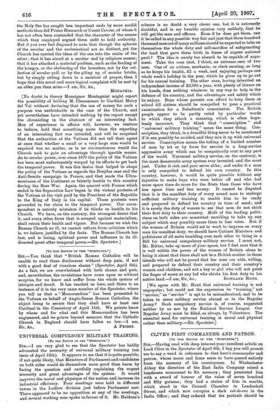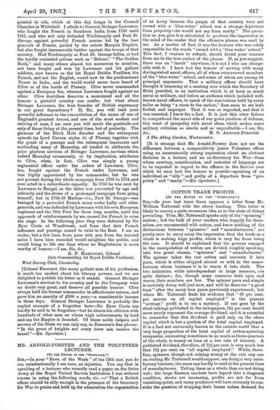OLIVE'S FIRST COMMANDER AND PATRON.
[TO vim. EDITOR OP TUZ .SPIXTPATOR...] Sfit,—Having read with deep interestyour excellent article on Lord Clive in the Spectator of April 6th, I beg you will permit me to say a word in reference to that hero's commander and patron, whose name and fame seem to have passed entirely from the memory of his countrymen. In Westminster Abbey the directors of the East India Company raised a handsome monument to His memory ; they presented him with a sword of honour of the value of seven hundred and fifty guineas; they had a statue of him in marble, which stood in the Council -Chamber in Leadenhall Street, and which now occupies a dark cul-de-sac in the India Office ; and they ordered that his portrait should be painted in oils, which at this day hangs in the Council Chamber in Whitehall. I allude to General Stringer Lawrence, who fought the French in Southern India from 1750 until 1761, and who not only defended Trichinopoly and Fort St. George against powerful French armies led by the best generals of France, guided by the astute Marquis Dupleix, but also fought innumerable battles against the troops of that eountry. Had Trichinopoly or Fort St. George fallen, or had the hardly contested actions such as " Bahoor," "The Golden Rock," and many others almost too numerous to mention, not been fought and won by Lawrence and his gallant soldiers, now known as the let Royal Dublin Fusiliers, the French, and not the English, would now be the predominant Power in India, and the world would never have heard of Clive or of the battle of Plassey. Clive never commanded against a European foe, whereas Lawrence fought against no other. Clive doubtless deserves a monument and all the honour a grateful country can confer, but what about Stringer Lawrence, the true founder of British supremacy in our great dependency ? If, Sir, you will lend your powerful influence to the resuscitation of the name of one of England's greatest heroes, and one of the most modest and retiring of men, I am sure you will merit the gratitude not only of those living at the present time, but of posterity. The glamour of the Black Hole disaster and the subsequent episode (as Lord Curzon styles it) of Plassey, together with the grant of a peerage and the subsequent inaccurate and misleading essay of Macaulay, all tended to obliterate the prior glorious services of Stringer Lawrence, services which indeed Macaulay erroneously, or by implication, attributes to Clive, when, in fact, Clive was simply a young regimental officer under the orders of Lawrence. Clive, too, fought against the French under Lawrence, and was highly appreciated by his commander, but he was not present during the whole campaign from 1750 to 1754, and ever acted in a subordinate capacity. In 1756 he was sent by Lawrence to Bengal, as the latter was prevented by age and infirmity and the stress of a prolonged campaign from going himself ; but in 1758-59 Madras—i.e., Fort St. George—was besieged by a powerful French army under Lally and other generals, and was defended by Lawrence with his own European regiment and the 79th Foot for three long months, until the approach of reinforcements by sea caused the French to raise the siege. In the following year they were defeated by Sir Eyre Coote at Wandiwash, and from that date French influence and prestige ceased to exist in the East. I am no writer, but a few lines from your able pen from the hurried notes I have here recorded would enlighten the public, and would bring to life one than whom no Englishman is more worthy of honour.—I am, Sir, Ac., G. F. HARCOURT, Colonel
(late Commanding 1st Royal Dublin Fusiliers). West Surrey Club, Camberley.
[Colonel Harcourt, like many gallant men of his profession, is ranch too modest about his literary powers, and we are delighted to publish his letter as it stands. General Stringer Lawrence's services to his country and to the Company were no doubt very great, and deserve all possible honour. Clive always held his former commander in affectionate esteem, and gave him an annuity of 2500 a year,—a considerable income in those days. General Stringer Lawrence is probably the capital example of a forgotten hero—Sir Eyre Coote can hardly be said to be forgotten—but he shares his oblivion with hundreds of other men on whose high achievements by land and sea the Empire is founded. Of these noble helpers and servers of the State we can only say, in Emerson's fine phrase : "In the press of knights not every brow can receive the laurel."—En. Spectator.]











































 Previous page
Previous page